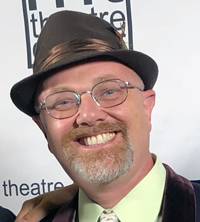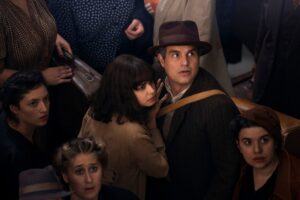
By Eric George Tauber

CINCINNATI, Ohio — How do we get through difficult times?
How can we find a ray of hope when all we see are shadows?
During the COVID-19 pandemic, many of us turned to streaming services like Netflix to cope with our feelings of boredom and isolation. My personal favorites were works of historical fiction like Versailles and Marco Polo. The romanticism and pageantry of these earlier times was my escape from the locked down world. All The Light We Cannot See takes us to an even darker time, France under Nazi occupation. There were no streaming services in the 1940s, but there were books and radios.
Based on the Pulitzer Prize-winning novel by Anthony Doerr, All the Light We Cannot See takes us into the world of Marie-Laure LeBlanc, a young woman who has been blind since the age of six. Under the Nazis, all radios were forbidden. The price of disobedience, whether broadcasting or just listening, was execution. Marie-Laure takes this risk, reading aloud from Jules Verne’s 20,000 Leagues Under the Sea printed in Braille. Her broadcasts attract the attention of Werner Pfennig, an expert radio operator with the German Wehrmacht.

Aria Mia Loberti plays Marie-Laure with uncanny wits, courage and resourcefulness. Through flashbacks, we meet her younger self (Nell Sutton) as she was taught to navigate without her sight. Mark Ruffalo plays her kind and clever father, Daniel. Knowing that his daughter will one day need to survive without him, Daniel constructs a model of Paris for the girl to navigate, first with her fingers and then with her feet. When Paris falls without much of a fight, Daniel and Marie-Laure flee to the quaint, coastal city of Saint Malo in Brittany, which then gets bombarded in Allied air raids. The Allies warn the residents to flee, but the Nazis have locked the gates, trapping them in.
Louis Hofmann plays Werner Pfennig with quick wits, a kind demeanor, and romantic optimism. Raised in an orphanage, Werner’s talents with radio got him pulled into military life and the maelstrom of the Nazi war machine. Werner’s orders are to find any illicit radio broadcasts and report them. But Werner doesn’t want to stop Marie-Laure. Her broadcasts are his one pinprick of light in a world of shadows. He only wants to keep listening without getting himself killed and he makes some very hard choices to that end.
Of course, we need a villainous Nazi officer in the mix and Lars Eidinger delivers as Reinhold von Rumpel. Before the war, he was one of the few non-Jewish jewelers in Germany, and now he is the only gemologist left. Equal parts clever and psychotic, Von Rumpel’s mission is to find a great diamond called “The Sea of Flames.” It belonged to the Museum of Natural History in Paris, but was, like so many precious things, spirited away before the Nazis could seize it. Legend has it that whoever possesses this diamond will never die but will also suffer great personal loss. Von Rumpel is obsessed with finding it and he is convinced that Marie-Laure knows where it is hidden.
This quest for a magic diamond is where we go from historical fiction to borderline fantasy with a plotline derivative of Titanic and The Holy Grail. This aspect could have lost it for me if not for the intense historical reality of the setting, stellar acting and hairpin turns of the tale.
All the Light We Cannot See is a mini-series streaming on Netflix in four hour-long episodes. Because of its intensity, I do not recommend binge-watching. Space them out and then decompress with a little stand-up comedy after each one. But one should definitely watch them as it is a tale worth knowing. More of us should aspire to the kind of courage, cleverness and determination that we see in Marie-Laure in the face of grave injustice. If we did, the world would surely be a better place.
*
Eric George Tauber is a freelance writer who specializes in the arts and social justice. Based in Cincinnati, Ohio, his work has been published in sdjewishworld.com, sdtheatrereviews.com, themoderatevoice.com, and jewishvoice.com. He can be contacted at ericgeorgetauber@gmail.com.